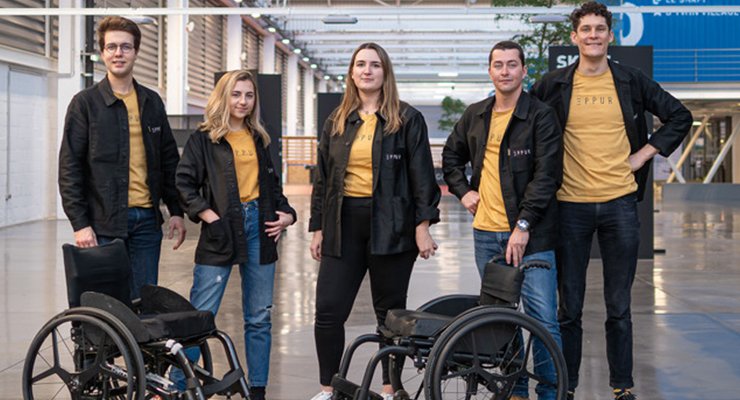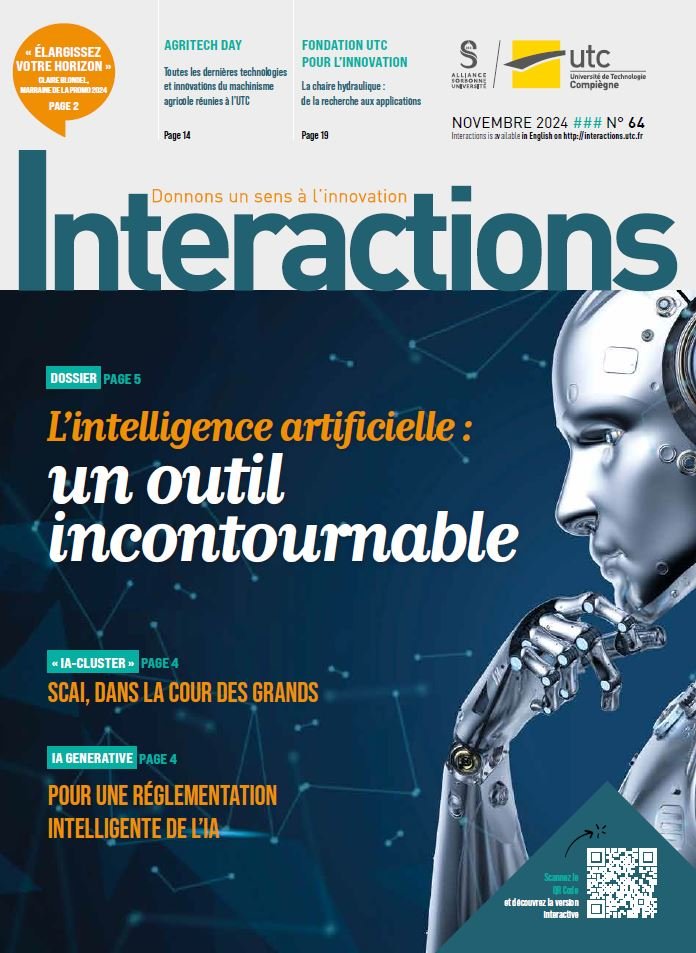Eppur, concentrated technology made in UTC

Colin Gallois and Lancelot Durand together founded Eppur, the first braking system for manual wheelchairs. The concept was born during Colin Gallois’ undergraduate years in the UTC design department in 2015.
A pair of wheels used for brake your wheelchair without injuring yourself — it was something to think about. Eppur, or rather Freewheelchair to start with, was born in Compiegne in 2015. Colin Gallois was just starting to study design at the UTC. «One evening, I crossed paths with a wheelchair user who was losing control of his chair on a slope. He was gripping the wheels of his wheelchair tightly in an attempt to slow down, but he couldn’t. I wondered why he didn’t do it. I wondered why he didn’t use his brakes? In the weeks that followed, I interviewed several manual wheelchair users. I realised that what I thought were brakes were actually parking brakes, used to bring the wheelchair to a complete stop, and that the only way to slow down was to use your hands like brake pads,» he recalls. Colin Gallois then began to work on the subject with a friend from the UTC, Xavier Garcia, and then with Lancelot Durand, also a UTC student, but also a colleague of his at Decathlon. «For several years, we worked on this project alongside our responsibilities at Décathlon. By 2021, we had working prototypes and very good feedback from users. The workload was heavy because we worked on the project in the evenings, after our day’s work at Décathlon,» explains the young entrepreneur, who now intends to make Eppur a mobility brand for people with disabilities. The team already has several ideas for new products and is currently working on expanding the range of mobility solutions.
James Dyson Awards and Concours Lepine
After taking his baccalauréat, Colin Gallois enrolled in a science preparatory class for the Grandes Écoles to prepare for the competitive examination to become an airline pilot, a profession he had dreamed of since childhood. After two years of preparatory classes and failing the pilot school admission exam, he decided to go for what he liked best: mechanics. He opted for a L3 in mechanics and engineering sciences.Colin Gallois et Xavier Garcia étaient également déjà premiers au James Dyson Awards en 2016 avec Freewheelchair. «During my undergraduate year, I discovered UTC’s Industrial Design Engineering course. It seemed to me to be the perfect combination of my scientific background and my creativity. So I applied and did three years at UTC in Mechanical Engineering, then in Industrial Design Engineering, interspersed with internships and stays abroad, in Singapore and Sweden, before doing my end-ofstudies internship at Décathlon». Following his end-of-study internship, Colin Gallois continued his career at Decathlon for five years as a designer, engineer, innovation manager, then product manager and design director until 2021, when he joined Eppur full-time. Last May, Eppur won the highest distinction at the Lépine competition. «It was an incredible recognition of our work and, above all, a wonderful opportunity to shine a light on our innovation and make it known to as many people as possible. We received several hundred messages and requests for product demonstrations — it was crazy! Colin Gallois and Xavier Garcia were also first runners-up at the James Dyson Awards in 2016 with Freewheelchair.
An innovation that came to be via a passion
« UTC gave me two exceptional partners, Lancelot and Matthias, as well as giving me the desire to fulfil my potential by developing products outside the classroom. Eppur wouldn’t have been born without a passion for the product, but above all for the user, and it’s this approach that still drives the whole team today. As for Décathlon, I like to think of it as my second school, after UTC,» concludes Colin Gallois. It’s an incredible company, which has enabled me to continue in the same vein as at UTC, creating products with very high value in use, in a highly stimulating professional environment.
Focus on the UTC Design programme
The Industrial Design Engineering programme, part of the Mechanical Engineering Department of the Universite de Technologie de Compiegne, is :
- 35 design engineers trained each year
- more than 50% women
- Engineers with dual skills (Mechanical Engineering and Industrial Design)
- An engineering degree (Bac + 5)
- A job placement rate of 83% in less than a month and 100% in less than 4 months
- 8 CC’s offered to students
- a unique project-based teaching environment
- 5 research full professors
A few examples of the success stories of UTC-ME-IDI students:
- Finalist in the 2015 Dyson competition — Xavier Garcia
- 1st at the James Dyson Awards 2016 - Colin Gallois, Xavier Garcia — Freewheelchair which will give rise to Eppur
- 1st at the James Dyson Awards 2018 — Tingyun DU & Yuchen
- 1st James Dyson Award 2019 — Romaric Delahaie and Mathilde Blondel — Eve, the anti-aggression bracelet
- 1st James Dyson Award 2020 — Auxane Caseiro and Charlyne Kerjean — Tuli, the revolutionary Cup
- Finalists in the Dyson 2021 competition — Jeanne Raynaud — Corentin Vercoor — Manche hospital staff
- Ingenieur du Futur 2021 Trophy — Agathe Boulet and Louise Thouron — Cosette- Senior Telephone




